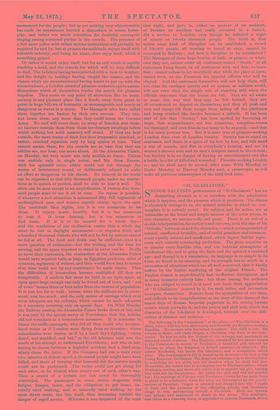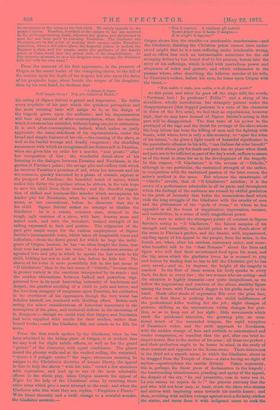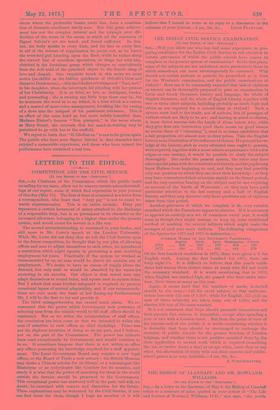"IL GLADIATORE."
SIGNOR SALVINPS performance of "II Gladiatore" has no distracting element in it to interfere with the admiration which it inspires, and the pleasure which it produces. The drama is absolutely strange to us, the mental attitude in which we con- template it is entirely novel. Its subject and its action are as unfamiliar as the broad and simple manner of the actor whom, in this character, we unreservedly call great. There is no veil of a double interpretation, the author's and our own, as in the case of his "Othello," between us and the character,—which is compounded of natural, unaffected brutality, and of stolid grandeur and common- sense equally natural and unaffected, which Signor Salvini repre- sents with entirely convincing perfection. The piece requires us to dismiss every familiar idea, and our habitual atmosphere of intellectual life, and to grasp the facts and the spirit of a vanished age ; and though it is a translation, its language is so simple in its form, so direct in its meaning, and its strength lies so much in a succession of situations which are all well contrived, that it hardly suffers by the Italian rendering of the original French. The English version is unpardonably bad, ineffective throughout, and in many instances entirely false ; but those among the audience who are obliged to resort to it need not have their appreciation of "Il Gladiatore" injured by it, for such action and intonation interpret themselves. Remote from the sympathies of our time, and difficult to its comprehension as the story of this drama of the basest days of Roman Imperial paganism is, the strong human motive which pervades it, and the power and skill with which the character of the Gladiator is developed, triumph over the diffi- culties of distance and isolation :- The following is the " argument " of the piece :—" The Gladiator is a slave, whose wife has been atrociously murdered by the Empress-mother, Faustina. He escapes with his infant daughter. The child is lost. He returns to Rome, and visits Origen, a Christian, who lives in the Cata- combs. To him he tells the history of his wrongs, and announces an intended revolt of slaves. The Empress, attended by her lictors, comes, to the Catacombs in search of Neodamia, a beautiful girl beloved by Flavian to whom the Empress is herself passionately attached. Sho misses Neodamia, but meets the Gladiator, and a recognition takes place. The lost daughter's life is bound up by an oracle with that of the young Emperor, Gordianns. The Empress promises help to the Gladiator in searching for his child, and his freedom when he shall find her. Meanwhile, she orders him to accompany her to Flavian's palace, where Neodamia resides, and there she orders him to murder the girl, leaving him with her for the purpose. Ho pities the girl, and will not murder her; the marriage of Flavian with Neodamia (whom he has made free) is about to bo celebrated, when the rites are interrupted by tho machi- nations of Faustina; Origen is arrested and dragged into the Temple of Juno and the presence of the officiating priests, and Noodamia clings to him, proclaiming herself a Christian. Both are thrown into prison, and sentenced to death in the arena. The Gladiator, also taken as a runaway slave, is appointed to execute Neodamia, whom.
he recognises in the arena as his lost child. He vainly appeals to the people's mercy. Faustina, horrified at the danger to her son involved an the girl's approaching death, adjourns the games, and determines to save her son from peril by rescuing Neodamia. The Gladiator and Neodamia are on the point of making their escape, under Faustina's protection, when a riot takes place, the Imperial palace is sacked, the Emperor is slain, and the people, under the guidance of the fanatic priest of Juno, burst into the prison cells of the Amphitheatre. At this supreme moment, to save his daughter from outrage, the Gladiator kills her with his own hand."
From the moment of his first appearance, in the presence of Origen as the secret leader of the conspiring slaves, to the fall of the curtain upon the depth of his despair, but also upon the dawn of his prophetic hope, when beside the corpse of his daughter, slain by his own hand, he declares that "B chiuso il regno
Dell' envie forza! Non piC schiavi al Monde,"
the acting of Signor Salvini is grand and impressive. He fulfils every requisite of his part which the quickest perception and the most exacting taste will assign to it, as the design of the tragedy grows upon the audience ; and his impersonation will bear any amount of after-contemplation, when the emotion which it awakens has subsided, without losing one jot in estimation. It is such after-contemplation, indeed, which makes us justly appreciate the many-sidedness of his representation, under the broad and simple features of his edk,—the cunning of the slave, as well as his fearful wrongs and deadly vengeance ; the chuckling amusement with which he recognises all her former self in Faustina, when she gives him an order for a murder, " cosi presto !" after her recognition of him ; the wonderful dumb-show of his listening to the dialogue between Faustina and Neodamia, in the garden of Flavian's palace ; the savage glee and raillery with which he receives Faustina's promises of aid, when her interests and his are common, quickly traversed by a gleam of ecstatic rapture at the prospect of freedom; the beautiful touch of nature which makes him flatter the populace whom he abhors, in the vain hope to save his child from their cruelty ; and the dreadful sugges- tion of skilled and business-like murder which accompanies his tender pity for Neodamia, when he takes hold of her in the arena, as her executioner, before he discovers that she is his child. Signor Salvini makes no attempt to idealise the Gladiator : he is a coarse, common man, arrayed in the rough, ugly costume of a slave, with bare, brawny arms and naked neck, and with the truculent, trained strength of his calling expressed in limb and gesture. The exigencies of the part give ample scope for the various employment of Signor Salvini's incomparable voice, which takes all imaginable tones and inflexions,—from the fierce growl for which he begs the indul- gence of Origen, because he has "so often fought the lions, that their roar has passed into his voice," to the tenderest accents of agonised love and pity in which he speaks the last words to his child, bidding her not to look at him before he kills her. The charm of his voice is more powerfully felt in the last scene of "11 Gladiatore" than in the last scene of "Othello," because there is greater variety in the emotions interpreted by its music ; and the sudden alternations between balked and powerless rage, paternal love in its most harrowing extremity of tenderness and despair, the gentlest soothing of a child in pain and terror, and the ferocious savagery of vengeance upon Faustina, his exultation in the overthrow of his oppressors, though the very worst has befallen himself, are rendered with thrilling effect. Before such acting the minor considerations of historical inaccuracy in the conception of the piece, and technical defects in the mounting of it, disappear ;—though we could wish that Origen and Neodamia had been supplied with scrolls for their studies, rather than
bound books ;—and the Gladiator fills our minds as he fills the scene.
From the first words spoken by the Gladiator, when he has been admitted to the hiding-place of Origen, it is evident that we may look for slight subtle effects, as well as for the grand " points " of the character, with equal confidence. The glance round the gloomy walls and at the vaulted ceiling, the surprised, "Quest() 6 it palagio vostro ?" the eager, erroneous meaning he assigns to the Christian's doctrine of human liberty, the appeal to him to help the slaves " with his hate," crowd a few sentences with expression, and lead up to one of the most admirable effects in the whole play, when Origen answers the appeal of Niger for the help of the Christians' arms, by vaunting those other arms which give a surer triumph to the soul; and when the Gladiator asks him what they are, replies, " Preghiera e Pianto !" With blunt sincerity and a swift change to a scornful wonder, the Gladiator answers,—
"Non li conosco. A vendicar gli antichi Nostri dolori non ci bests. il sangue,—
E to In'offri is lagrimer
Origen shows him the crucifix—a pardonable anachronism—and the Gladiator, thinking the Christian priest cannot have under- stood aright that he is a man suffering under intolerable wrong, and so offers him such an unreasonable substitute for the old avenging deities he has found deaf to his prayers, bursts into the story of his sufferings, which is told with marvellous power and eloquence of voice and gesture, and which culminates in the passage where, after describing the hideous murder of his wife, by Faustina's orders, before his eyes, he turns upon Origen with the taunt,—
" Non cadde fl cielo, non cadde, e to di Dio mi parlit"
At this point, and when he goes off the stage with the words, "Perdonar lord ! Io perdonar ? Follia!" and a shrug of the shoulders, wholly incredulous, but strangely patient under the disappointment (this dogged patience is a note of the character
in three of the five acts), we feel that no expectations, however high, that we may have formed of Signor Salvini's acting in this part will be disappointed. The first taste of his power in the portrayal of the rage and the thirst for revenge of the slave whose life-long labour has been the killing of men and the fighting with beasts, with whom love is only a dim memory, to "spur the sides of his intent,"—he gives a light touch of beautiful significance to the parenthetic allusion to his wife, "tine Gallese dui crini biondi —and with whom pity for death and pain has no place when death and pain are to be inflicted as part of the day's work, suffices to assure us of the treat in store for us in the development of the tragedy. In this respect, "II Gladiatore" is the reverse of "Othello," although in one particular, the restrained strength of the earlier, in comparison with the unchained passion of the later scenes, the actor's method is the same. But whereas the catastrophe of " Othello" revolts, that of "II Gladiators" satisfies ; it is the crown of a performance admirable in all its parts, and throughout which the feelings of the audience are roused by skilful gradation to the pitch of intensity that befits the tremendous deed which ends the long struggle of the Gladiator with the cruelty of men and the pitilessness of the "gods of stone," to whom he has appealed in all the tones of supplication, imprecation, menace, and malediction, in a scene of truly magnificent power.
If we were to select the strongest points of contrast in Signor.
Salvini's acting in "11 Gladiators," the fairest samples of his strength and versatility, we should point to the dumb-show of the scene in Flavian's garden, and the frantic, wild, impassioned, cajoling agony of his appeal to the people, from the arena, in the fourth act, when, after his careless, customary entry, and some- what boastful talk to his " dear Romans " about the lions and tigers who will find their accustomed food upon his arms, and the big arena which the gladiator loves, he is aroused to pity and horror by finding that he has to kill the Christian girl he has once saved,—and so, by degrees, the height of the tragedy is reached. In the first of these scenes, his body speaks in every limb, his face in every line ; the two women who are acting—and the situation is highly dramatic—are quite insignificant, as we follow the impressions and resolves of the silent, stealthy figure among the trees, with Faustina's dagger in his girdle ready to his hand. Shade after shade of expression flits over the grim face, where at first there is nothing but the stolid indifference of the professional killer waiting for the job ; slight changes of posture, shifting as the unconscious victim changes her posi- tion, so as to keep out of her sight ; little movements which mark the quickened attention, the growing pity, an occa- sional touch of the concealed weapon, the rapid reception of Faustina's order, and the swift approach to Neodamia, with the sudden change of face and attitude to unrestrained and tender compassion, so manifest that the girl, after one brief in- stant's terror, flies to the shelter of his arms ; all these are perfect ; and their perfection ought to be borne in mind, in the study of their contrast and opposite in the Arena scene. There intervenes in the third act a superb scene, in which the Gladiator, about to be dragged from the Temple of Juno—a slave having no right of asylum—apostrophises the marble divinity. Taken separately, this is, perhaps, the finest piece of declamation in the tragedy ; the heartrending abandonment, pleading, and agony of the appeal, the despair of the cry, " In ciel proscritto, corn in terra son io. La mia, catena mi separa da to ! " the piteous entreaty that the god who will not hear may, at least, crush the slave who strains and strives with imploring arms towards his marble knees ; and then, revolting with sudden outrage against such a divinity, strikes the statue, and turns from it with indignant scorn to seek the circus where the preferable beasts await him, form a combina- tion of dramatic excellence rarely seen. But this great achieve- ment has not the complex interest and the triumph over dif- ficulties of the scene in the arena, in which all the resources of Signor Salvini's art are taxed, and found sufficient. In this, too, his body speaks in every limb, and his face in every line, in aid of the torrent of supplication he pours out, as he leaves the wretched girl kneeling upon the floor, while he rushes along the curved line of merciless spectators, or drags her with him, clutched in the herculean grasp which changes so marvellously from the deft hold of the practised slayer to the frantic clasp of love and despair. One exquisite touch in this scene we must notice (as skilful as the hidden quickness of Othello's blow and threatto Desdemona),—it is the Gladiator's whispered " Taci, taci !" to his daughter, when she interrupts his pleading with her protest of her Christianity. It is so faint, so low, so indulgent, tender, and persuading ; she is ruining any little hope there may be, but he murmurs the word as to an infant, in a tone which is a caress, and a marvel of mere voice-management, breaking like the cooing of a dove into the tempest of his passionate utterance. This is an effect of the same kind as, but more subtly beautiful than, Madame Ristori's famous "Non piangera," in the scene where, as Mary Stuart, she entreats that her maid-in-waiting may be permitted to go with her to the scaffold.
We regret to learn that "II Gladiatore " is not to be given again. The public who have seen Signor Salvini in that character have enjoyed a memorable experience, and those who have missed the performance have sustained a real loss.




































 Previous page
Previous page